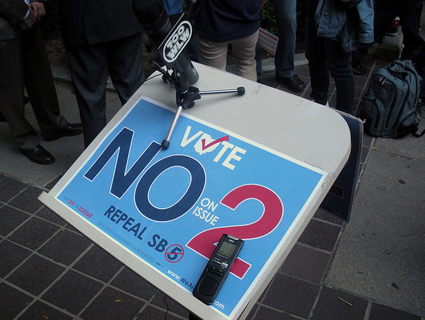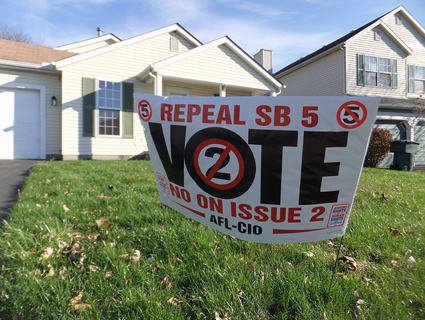
<a href="http://www.flickr.com/photos/progressohio/6211924132/sizes/z/in/photostream/">ProgressOhio</a>/Flickr
Tuesday night’s state and local elections didn’t carry quite the same punch as the midterms of 2010, but with two governorships, a handful of state legislatures, and two hot-button ballot initiatives on the line, it offered a quick temperature check on how the nation’s doing. As it turns out, things could have gone a lot worse. So if you went to bed early, here’s what you missed:
- Ohio: Voters overwhelmingly rejected Republican Gov. John Kasich’s controversial union-busting law, which would have severely curtailed collective bargaining rights in the state. More Ohioans voted to repeal Kasich’s signature piece of legislation than voted for Kasich last November. It was a big win for progressives, but as Andy Kroll reports, don’t put Ohio in the blue column for 2012 just yet.
- Mississippi: Republican Lt. Gov. Phil Bryant upgraded his seat to “Governor” with victory over Democrat Johnny DuPree, but the big story here was the surprisingly easy defeat of Question 26—a constitutional amendment to redefine zygotes as people. Supporters of the measure, which would have banned abortion even in cases of rape and affected everything from in vitro fertilization to fire codes, made their final pitch to voters by distributing a graphic film comparing reproductive rights to the Holocaust. (On Monday, Bryant told a woman who had been raped that if Question 26 fails, “Satan wins.” So make of that what you will.) In a win for Reublicans, a constitutional amendment to require state-issued identification to vote also passed.
- Arizona: GOPer Russell Pearce became the first sitting Senate president ever to lose a recall election—to fellow Republican Jerry Lewis (not that Jerry Lewis). Why should you care? Pearce was the architect of Arizona’s SB 1070 immigration law, which he drafted at the behest of private prison lobbyists. Democrats won mayoral races in Tucson and Phoenix, and in a feel-good story, Daniel Hernandez, a hero of the Gabby Giffords shooting, was elected to his local school board for the Sunnyside Unified School District.
- Kentucky: Democrats won five of six statewide contests, including the governor’s race, where incumbent Steve Beshear easily handled GOP challenger David Williams. This was noteworthy only because Williams spent the final days of the race accusing Beshear of “idolatry” for attending a Hindu prayer ceremony. So what lessons can Obama take from Beshear’s success? None, really. Beshear’s a very conservative Democrat who recently secured $43 million in tax credits to build a replica of Noah’s Ark.
- Maine: Another item for the “GOP overreach” narrative. Voters approved Question 1, which restored a law allowing citizens to register to vote on election day. The same-day registration law had been repealed by Republican Gov. Paul LePage and the GOP-led Legislature.
- Virginia: With one race still too close to call, Republican appear to have taken control of the state Senate (they already controlled the House of Delegates). Democrat Adam Ebbin won his race to become Virginia’s first openly gay state senator.
- Iowa: Good news for gay marriage supporters. Democrats won a special election for a vacant state Senate seat, thereby retaining control of the upper chamber and dashing the hopes of social conservatives who’d hoped they’d finally have to votes to ban gay marriage. It cost a pretty penny, though; the Des Moines Register estimated that the two sides combined to spend a Wisconsinesque $1 million in the special election.
- Massachusetts: Via our friends at Unicorn Booty, Holyoke elected its first gay mayor, 22-year-old Alex Morse.
- San Francisco: Interim Mayor Ed Lee came one step closer to becoming the first Asian American to win a mayoral election in the city. Lee was the beneficiary of the most original ad of the 2011 cycle, which featured MC Hammer, will.i.am, Giants pitcher Brian Wilson, and three apparently very stoned voters:













